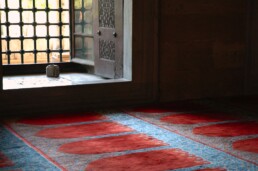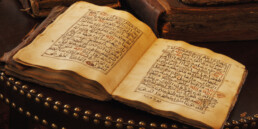Are the devils literally chained up during Ramadan?
It’s commonly held that because the devils are chained up during Ramadan, anything bad that is done is entirely from the perpetrator, the devil cannot be blamed since he was not present nor working his misguidance. This view is taken from the following hadith (prophetic narration) reported by Abu Hurairah:
“When Ramadan comes, the gates of paradise are opened, the gates of hell are closed, and the devils are chained up.”
al-Bukhari and Muslim
In short, this hadith can be taken (for brevity) in two ways since there doesn’t seem to be much context related around it.
Must we break our fasts with dates - is it ‘better’?
This post is an exploration of the view that we ought to break our fasts with dates. The assumption comes from two main hadith, one is the hadith of Salman b. Amir al-Dabbi: ‘If you break your fast then do so with dates, and if you don’t find any, then with water for it is a purifier for you’ (al-Tirmidhi) which is considered a weak by some hadith scholars. The second is the description of the Prophet, related by Anas b. Malik and reported by Abu Dawud, that the Prophet would consume a few fresh dates or dry dates if he didn't have fresh dates, or water if no dates were present, before offering the Maghrib prayer.
Thinking about the second hadith, the view of Ibn Taymiyyah came to mind:
Similarly, so when he ate dates and bread made from barley (and their like) – all the staple food of his country, does (the notion of) emulating the Prophet mean to specifically intend dates and barley to the extent that it is done by those who neither have dates growing in their lands nor does barley make up their staple diet, but where their staple consists of wheat, rice or other things? It is known that the second is legislated, the evidence of which is that upon the conquest of new regions the Companions would eat the staple of the respective country and wear the clothing of those lands, rather than intentionally seeking the staple foods of Madinah or its clothing. For if the second (i.e. seeking the staple foods of Madinah or its clothing) was better for the Companions they were worthiest of choosing the better.
Majmu’ al Fatawa, Kitab Salah
Some points:
1. It’s important to keep in mind that dates were the staple diet of the Arabs, easily and abundantly accessible, and something they’d eat everyday, all year round (dried for the off-season).
2. If we argue that the hadith establishes an istihbab (shar’i recommendation), is the only thing we take from the hadith the recommendation to break the fast with dates? The hadith ALSO states that the Prophet wouldn’t drink water, doing so only if he didn’t have dates, and that he’d only eat dates before Maghrib prayer. So is the recommendation only to eat dates, or a holistic one that says one ought to break the fast exclusively with dates (and no water) before the Maghrib prayer? If we say no, one may accompany the dates with water (and a whole host of fried fritters), and then pray, is this still ‘the sunnah’? What this speaks to is the way many enact the hadith of Anas b. Malik. They’ll staunchly argue that the hadith informs us that it’s better to break the fast with dates, but rather than follow the hadith through and offer the Maghrib prayer, they’ll follow up the dates with water and other drinks as well as a rich array of fried fritters: samosas, pakoras, falafels etc. If it’s “better” to eat dates because the hadith tells us this, then what for the rest of the hadith? This partial emulation seems inconsistent.
3. Here I’m simply critically exploring the idea that it’s a religiously obliged value to specifically eat dates and whether the Prophet doing so might have been a cultural fact rather than a religious one. The authoritative Hanbali jurist, Mansur al-Bahuti, explained in reference to the hadith of Anas b. Malik that what is analogous to fresh and dry dates is "everything sweet that isn't cooked." (Sharh al-Muntaha)
4. Given that we live in the UK and dates neither make up our staple diets nor are they relatively cheap, the extra effort to purchase dates seems unnecessary. Of course, the idea of buying dates to help Palestinians is a worthy cause, but this specific project of support seems to be one that ought to practiced the entire year - not specifically during Ramadan, and is more a political cause than related to shar’i thoughts around break-fast (iftar).
5. For those who like dates and have them available, I believe there’s value in breaking the fast with them, then praying, and then drinking water etc. However, context will heavily determine what’s optimum. For example, if you’re cutting sugars from your diet then dates may not be the best option, and likewise, if you’ve been lifting heavy in the gym and require a protein boost, then perhaps a protein smoothie is more apt.
6. Given the fact that most of our fruits in London are imports, dates can be accessed like many other fruits, so is it better to opt for dates instead of other fruits? If we argue it is mustahab (recommended) to break the fast with dates then of course yes. But if we see it as a cultural proclivity, I guess it’d be down to a matter of personal preference and looking for something analogous, a natural product that is sweet (fruits, etc).
Fajr thought
A while back someone asked me, "Don't you think it'd be an idea to change the fajr time closer to 7am all year round since that's when our day starts and getting up during summer hours is difficult?
Some thoughts:
- There's a reason the fajr call to prayer includes "Salah is better than sleep".
- As some hadith indicate, some sahabah also found waking for fajr challenging.
- If (and probably when) some research comes out that suggests waking up for a while during summer nights for some meditation is beneficial, the same folk who were complaining yesterday will say: "Look at the wisdoms of the Lawgiver!"
- It's reported that the Prophet wouldn't speak to people after Esha prayer, and would retire quite soon after. So perhaps the problem isn't about getting up early, but when we actually go to bed?
- There is a reason that the fajr Salah is the shortest of the five (two units/rakat), what do you think they are?
"But sometimes I miss fajr"
For those who are God-conscious, this can be an affair that weighs down heavy on the soul (and should do). Some live in absolute despair until it breaks their drive and motivation, and quite paradoxically, they give up altogether! But I would urge that intention is all important. The one who intends to get up and mistakenly oversleeps or presses the snooze button differs from the one who had no intent at all and made no conscious preparation.
A'ishah (related by Abu Dawud) and Abu Darda (related by Ibn Majah) narrate from the Prophet that the one who goes to bed intending to awaken during the night to pray but doesn't because his tiredness overcomes him will be recorded as he intended (i.e. rewarded) and the sleep is considered a sadaqah (charity).
Some scholars put this hadith down to the Esha prayer, some to tahajjud (the optional night prayer), and some to fajr. The Maliki jurist and hadith master, Ibn Abdil Barr, wrote in explanation of this hadith:
مَنْ كَانَتْ عَادَتُهُ الْقِيَامَ إِلَى صَلَاتِهِ الْمَكْتُوبَةِ أَوْ إِلَى نَافِلَتِهِ مِنَ اللَّيْلِ فَغَلَبَتْهُ عينه : فقد جَاءَ عَنْهُ صَلَّى اللَّهُ عَلَيْهِ وَسَلَّمَ أَنَّهُ يُكْتَبُ لَهُ أَجْرُ صَلَاتِهِ ، وَنَوْمُهُ صَدَقَةٌ عَلَيْهِ
Whoever's habit is to perform the obligatory or non-obligatory prayer during the night, and his eyes overcome him, then it comes from the Prophet that a reward for the (missed) prayer is recorded and his sleep is deemed charity (from God)."
al-Istidhkar
This is analogous with the one who mistakenly eats or drinks during Ramadan forgetting that he's fasting, for as the hadith of Abu Hurairah (Bukhari and Muslim) goes, it is God who (charitably) feeds him.
God is merciful and looks out for His sincere servants. As long as you have no intention to offend God or be consciously negligent, why assume God is mercilessly vengeful, or petty?
God is great, supreme in His power and glory, and a benign King of kings. As such, Abu Dharr relates from the Prophet that he said those who offer the fajr prayer are left "in the charge of God", meaning that He personally looks after their affairs, protecting them, for the rest of the day. From my own anecdotal experience, any day that starts with a meaningful fajr prayer, contemplating the words of the Most High and consciously expressing my subservience to Him through bowing and prostrating, sincerely trusting in His plan and divine ability to do all things, ensures that day unfolds a beneficial one.
And of course, if you have been overcome by sleep (or even if you haven't been) and the sun has risen, offer the prayer with a penitent heart to show you care, expecting God to overlook your shortcoming due to His infinite mercy.
Moonsighting: Where are you looking?
Kurayb relates that Umm Fadl sent him to Mu'awiyah in Shaam (the Levant):
I arrived in Shaam and discharged her affairs. Ramadan then dawned upon me whilst I was in Shaam and I saw the new moon myself on Friday night. Later I arrived at Madinah at the end of the month. Abdullah b. Abbas enquired, mentioning the new moon. He then said: 'When did you seen the moon?' I said: 'We saw it on Friday night.' He said: Did YOU see it?' I said: 'Yes and so did the people, they fasted and so too did Mu'awiyah (the caliph).' He said: 'We saw it on Saturday night and we'll continue to fast until we complete thirty (days) or we see the new moon.' I said: 'Does the sighting of Mu'awiyah and his fasting not suffice you?' He said: 'No, for this is what the Messenger of God commanded us to do.'
Muslim
Some interesting points:
- Al Tirmidhi titled a chapter in his Sunan: 'the people of each land/country to determine their own sighting.'
- Those who argue for global sighting do not have a specific narration, but rely on the generality of the prophetic command to fast when you see the moon, where 'you' is said in the plural. So they take the plural to infer all Muslims, rather than a specific community of believers. However, the narration of Kurayb above clarifies how the use of plural pronoun is to be taken.
- Abul Abbas Al Qurtubi inferred from Ibn Abdil Barr that the disagreement over the obligation (as stated by other Imams), or otherwise, of following other places was only if they were close. Ibn Abdil Barr relates a juristic consensus (ijma) that the moon being sighted in one location is not considered where there is significant distance between the two lands, such as between al-Andalus (Spain) and Khurasan (Afghanistan). The modern notion of global sighting was a redundant issue back then simply because of the lack of modern communication and transportation. It would have been untenable. Often, we impose the modern context on the past and miss what they were exactly debating.
- Given the concerns that some have over the processes behind sighting in other countries, bodies have already been setup in the UK to look out for the moon.
- Much of the debate in this country, in the end, tends to boil down to sectarian allegiences rather than a pragmatic resolution to administrative processes.
I believe that the longstanding debate could have (and still can be) easily resolved with a bit of intelligence, pragmatism and maturity. In fact, the whole debacle is indicative of why Muslims are woeful at politics (which is effectively communal decision making).
What is Salah?
Salah is the ultimate expression of subservience to the Most High, ordained by God from the earliest times of Sapiens' existence (Q 42:13), and both a physical and cognitive display of deep humility and reverential awe for the Lord of all that exists.
It requires the one who is subservient to express it by standing before his Lord, bowing to his King, and to bow down on the ground in total surrender with his face to the floor out of abject humility (Q 17:109). It incorporates praise, thanks, humility and purification for the Most High (Q 2:30). It demands engagement and contemplation of God's words (Q 73:20). It requires sincere self-effacement and a heart that palpitates at the idea of God's eternal and unfathomable supremacy as well as one's own shortcomings in fully recognising that supremacy.
It's often said "You need to just pray", or people are emotionally impelled to salah through warnings of eternal damnation. In contemporary times where identity politics becomes a key motivator, the doctrinal "If you don't pray you're not a Muslim" argument has become widespread. Whilst all of these have precedent in some way within the nusus or doctrinal tradition, they do not reflect the central way in which God spurs man to stand before Him at appointed times throughout the day.
There's a reason as to why God repeatedly tells us about His acts of creation, from the heavens and the earth, to living organisms within them, and sentient life forms beyond. God invites the human intellect to ponder over a cosmos teeming with life and order in order to discover His supreme greatness, and to recognise that the one who gives life is also alive, ever-present, ever-active in the affairs of all things.
We have life, we have love, and we have hardships. Throughout all of these there is one principle God says, and that is to remember God (Q 20:14) giving thanks (Q 4:147). To stand before God a few times, for a few moments in the waking day, is to express appreciation for what we have and to request more. It's to show God that we individually care, that we are compelled by His utmost majesty and spectacular power, His blinding glory and limitless grace, and that we desire the personal relationship He reserves with each and every sincere servant. Everything else is sophistry and tangential.
Of course, to understand salah like this necessitates knowing God. The condition and constitution of one's salah is reflected by one's understanding of the Most High, which in turn represents the nature of the relationship between the servant and her Master.
On another note, I wouldn't call salat 'prayer', not because it's wrong per se but because it fails to capture the entirety of what God wants. In modern times, prayer can simply refer to an invocation, and often evokes images of people doing ritualisms that they can't entirely explain or justify. In no way does the Salat represent this - it is the highest and most intimate expression of subservience for those on the creed of Abraham. This ought to resonate with anyone of any Abrahamic faith, the salah was ordained to every prophetic nation.
I acknowledge that there's a lot to unpack here (which I do in seminars, workshops and lectures), but what I hope to briefly touch upon is that profound subservience to God through salat is predicated on our knowledge of God and also what He ultimately wants, to serve God properly requires this knowledge (at least at a basic level) and contemplation.
Indeed, the creed of Abraham is a thinking one, fully appreciated by intelligent folk.
The Qur’an: Songs, Sounds, or Meanings?
The current status quo has meant that we marvel at those who memorise the Qur'an, and commend its articulation as phonemes. Is this the particular status-quo that God intended, and is it okay to say this is enough?
God said of the Qur’an and revelation:
- ‘This is a blessed Scripture which We sent down to you, for people to think about its messages, and for those with understanding to take heed.’ (Q 38:29)
- ‘This, too, is a blessed Scripture which We have sent down; follow it and be conscious of your Lord, so that you may receive mercy - lest you say, ‘Scriptures were only sent down to two communities before us: we were not aware of what they studied.’ (Q 6:155-156)
- ‘Be devoted to God (rabbani) in that you teach the Scripture and in that you study it.’ (Q 3:79)
There is nothing in the Qur’an that tells us that God seeks the mere articulation of Arabic phonemes, and when we think about it, to treat a message like this in any other context would be quite strange. The assumption that mere recitation or memorisation, whether of ourselves or our children, is a saving grace, is deeply misplaced.
How so?
Ziyad b. Labid said: The Prophet mentioned something and then said, “…that shall be in times when knowledge (in the form of guidance) is gone.” I said: "Messenger of God, how shall (such) knowledge disappear when we recite the Qur'an, and have our children recite, and our children shall have their children recite it until the Day of Judgment?" He said, “Woe to you Ziyad, I considered you the most intelligent man of Madinah! Do not these Jews and Christians recite the Torah and Bible, but know little of what is in it?"
Ibn Majah
So is this not the case with western Muslims? Do we not rejoice at the thought of beautifully sung exotic sounds - believing that being moved by melody is a ‘spiritual’ effect (which in fact can equally go for various genres of music)? The Qur'an points to understanding rather than sounds: ‘Will they not contemplate the Qur'an? Do they have locks on their hearts?’ (Q 47:24)
Due to this misfocus the purpose of revelation is being lost. As the hadith of Ziyad intimates, knowledge (in the form of guidance) remains in the Quran. What type of knowledge? It is popularly assumed it is ‘religious’ knowledge, reserved for the Maulana/Alim types, but this deeply incorrect. God guided the ‘normal’ man through the Quran, in his daily political, social, and economic life, imbuing every step with an ethical and productive trajectory.
There is no ‘Muslim leadership’ without knowledge of what’s in the Qur'an. Leadership isn’t merely to make PR statements or to assume some secular pursuits but to know what God wants and to help guide people to it, to champion it, and to seek to preserve it. We are at liberty to ask: do Muslim leaders represent an ethnic group called ‘Muslims’, or do they represent believers? If it is the latter, then surely they should be those who are most informed in the Qur'an, and on social and political matters. Equally, there is no ‘da'wah’ without knowledge of what’s in the Qur'an, both in method and in objective, otherwise what exactly are we calling to? There is no discussion on social inclusion, integration, or the ‘common good’ without knowledge of what God has said in terms of fundamental objectives. The Qur'an is the basis of everything ‘Islamic’ and without intimate enquiry any ‘Islamic’ or ‘Muslim’ related claim is rendered redundant.
Whilst there exists a culture to have our children memorise the book of God, often to accrue some form of social capital amongst other Muslims, consider this: Imam Malik was asked about seven year old child made to memorise the Qur'an. He said "I don't think that is appropriate." al-Abhari said in explanation: 'Malik disliked it, because if a person memorises it this quickly he cannot properly retain it, knowing the parameters it sets. The path of he who learns the Qur'an is that he studies it, unearthing it's laws and knowing the parameters it sets, according to his ability, and a child in most cases is unable to do this. The Companions would remain with one long surah studying it, uncovering all the ahkam within it.' (Sharh al-Jami', Ibn Abd al-Hakam)
Many overlook the notion of specific Qur'anic guidance on contemporary issues, but only because they do not know how to benefit from the revealed word or extract that guidance, and having been witness to many a charlatan stating generalities or far-fetched interpretations that rail against common-sense, they understandably conclude, often subconsciously, that the guidance of the Qur'an is abstract or non-existent. However, the Qur'an is explicitly relevant to 21st century western issues, in fact, most of it is in plain sight. What we clearly have to do is commit some time to giving this knowledge its due, otherwise we proceed merely with Improvised Religion. The Prophet explicitly warned of the state of Christianity or Judaism - despite ‘reciting’ revelation, they had little guidance because of ignorance concerning what revelation contains, and neglecting to learn how to be informed in their personal, social and political affairs by it, or how to operationalise it. Essentially, it led to great deviations from what God wants.
This is something we all ought to reflect upon, and seek to address, preferably together!
Meaning IS the reason for reading the Qur’an
For quite a while, many scholars and preachers have called for believers to understand the scriptures revealed by God and to engage the divine message, yet the majority of British Muslims do not, opting instead to hastily get through the Qur’an as Arabic phonemes (units of sound), and as many times as possible. It’s absurd, and only the devil could make us believe the situation is both logical and/or acceptable.
To believe pronouncing phonemes suffices is to undermine the entire reason why messengers were sent to mankind, “They were messengers bearing good news and warning so mankind have no excuse before God…” (Q 4:165) We’re told that it’ll be said to the disbelievers at the gates, “Were you not sent your own messengers to recite the revelations of your Lord to you and warn you that you’d meet this day?!” (Q 39:71) Of course, by “recite revelation” the gatekeepers will not mean pronouncing Arabic phonemes, but reading and understanding what God said. Understanding is inherent in all of these verses (and many more) since they wouldn't be valid points otherwise, yet the bizarre status-quo has most of us doing something else and then presenting poor arguments to justify it.
Having discussed this with many people, I've come to see a general pattern of conversation and debate. So to summarise, here is a brief presentation that attempts to provide a holistic understanding towards Qur’an recitation in Q&A form. Please bear in mind that I do not utilise every argument nor every response to possible retorts, it merely concerns itself with the oft-invoked sources and arguments used to justify the ill-informed status quo.
Seminar on Ramadan
What is Ramadan about in the Qur’an? Is it holy? What is the month's purpose? What does God exactly want from us and how does He expect us to spend the month? What are we meant to get out of it?
What is the purpose of fasting? Is it simply not eating and drinking during daylight hours?
What do our practices of multiple Qur’an khatms (completions in Arabic), tarawih, imported dates and iftar feasts achieve? Is there more to our practices than we’ve realised and are we doing everything we realistically can, or should?









